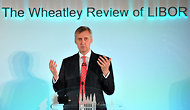 Carl Court/Agence France-Presse — Getty ImagesMartin Wheatley, managing director of Britain’s Financial Services Authority, said London’s reputation as a global center for financial services had been tarnished by the Libor scandal.
Carl Court/Agence France-Presse — Getty ImagesMartin Wheatley, managing director of Britain’s Financial Services Authority, said London’s reputation as a global center for financial services had been tarnished by the Libor scandal.
LONDON – A leading British regulator officially unveiled the government’s plan to overhaul the rate at the center of the manipulation scandal, but conceded that problems could still persist.
On Friday, Martin Wheatley, the managing director of the Britain’s Financial Services Authority, the British regulator, acknowledged that regulators should have stepped in sooner to fix the problems with the London interbank offered rate, or Libor. He also confirmed the broad strokes of the proposal, which came after a three-month review.
British authorities, which will provide more oversight, want to make it a criminal offense to alter the rate for financial gain. They also plan to implement new auditing systems to ensure traders cannot unfairly profit from small changes to Libor.
“There’s always a possibility for collusion,” Mr. Wheatley told an audience at Mansion House, the 260-year-old home to the lord mayor of London that is adorned with gilded statues and chandeliers. “But under the new regulatory structure, people would be taking a high risk.”
The proposed changes come amid an investigation into potential rate-rigging at big global banks like HSBC, UBS and JPMorgan Chase. In June, the British bank Barclays agreed to pay $450 million to settle allegations that some of its traders tried to manipulate Libor for financial gain. The firm was also accused of understating its rates submissions to make the bank appear healthier during the financial crisis.
Mr. Wheatley, who will lead the Financial Conduct Authority, a new British regulator that will become part of the Bank of England next year, said London’s reputation as a global center for financial services had been tarnished by the recent scandal.
In response, the country’s authorities have stripped the British Bankers’ Association, the London-based trade body that currently oversees Libor, from its powers to control the rate. A new administrator will be appointed over the next 12 months.
Organizations will be able to start pitching for the position next week. The data providers Bloomberg and Thomson Reuters, which collects the daily Libor submissions on behalf of the British Bankers’ Association, as well as NYSE Euronext have expressed interest in taking on the role. Users of Libor will still pay for the financial information, Mr. Wheatley said on Friday.
Regulators are aiming to improve the accuracy and reliability of Libor, which measures the rate at which banks lend to each other. To do so, they want banks to base the rate submission on actual market transactions whenever possible.
As part of that effort, authorities are planning to focus on fewer markets that are the most liquid. Five of the current 10 currencies, including the Swedish krona and Canadian dollar, will be removed over the next 12 months. The number of rates also will be reduced to 20, from 150.
British regulators will take a more hands-on approach with the rate. They plan to audit banks’ daily Libor submissions to avoid rate manipulation.
Even so, Libor will not be immune to manipulation. Because of limited interbank lending activity, Mr. Wheatley said, sometimes the rates would have to be based on a level of judgment from banks on what interest rates they would be able to secure from other firms.
“There’s still a risk,” he said.
Article source: http://dealbook.nytimes.com/2012/09/28/british-regulators-unveil-overhaul-to-libor/?partner=rss&emc=rss
Speak Your Mind
You must be logged in to post a comment.